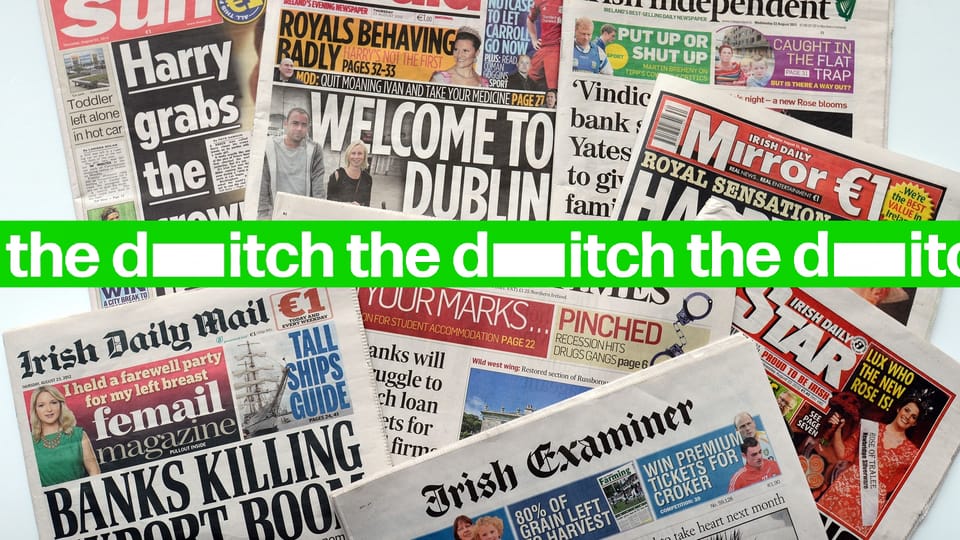I’ll say this about John Bruton: he got a fitting send-off.
Bruton, who died last week at the age of 76, was granted precisely the kind of state funeral one might envisage for a distinguished Fine Gael man. Taoiseach Leo Varadkar took digs at republicans during his oration; convicted criminal Michael Lowry stood mourning by the graveside; a group of reporters watched in awe as soldiers fired a volley of shots over Bruton’s coffin. Here was, we were told, an exceptionally decent man whose life was characterised by a deep commitment to Ireland and the European Union. Bruton changed this country "considerably for the better", said Varadkar. “And changed us for the better too.”
Bruton’s friends, family, and party colleagues are free to celebrate his life and achievements in whatever way they deem fit. And there’s plenty for them to remember fondly. Bruton left this mortal plane a very wealthy and successful man, surrounded by loved ones, having reached what many regard as the pinnacle of Irish and European politics. The media however has a duty to critically analyse his career. An assessment of John Bruton’s conduct as a political actor is not a personal attack on him as an individual.
A misunderstood patriot
High praise would have been fine were it accompanied by a thorough examination of Bruton. Media instead began a beatification. John Bruton’s blog is a treasure trove of wisdom, decency, good humour and the odd rebuke, said Breda O’Brien, in the Irish Times, who noted that Bruton, a lobbyist and multi-property landlord, had the quality of seeming “ordinary.” Eilis O’Hanlon, writing in the Sunday Independent about Ireland’s most famous Redmondite, lamented the death of an older, now maligned Ireland that created men of Bruton’s calibre. Her colleague Brendan O’Connor argued that Bruton’s funeral “could teach us all a lesson” because, O’Connor said, it didn’t blather on and on about what a great guy he was.
Why bother when you’ve got the media to do that for you? Pat Leahy graciously contributed a listicle to the fawning coverage, outlining seven lessons Leo Varadkar could learn from John Bruton (These lessons included gems such as “learn from your mistakes”.) A gushing Leahy further suggested on an Irish Times podcast that had Bruton won the 1997 election, the 2008 crash mightn’t have been quite as painful for Ireland. According to broadcaster Matt Cooper, Bruton was a “misunderstood patriot” whose infamous VAT increase on children’s shoes, if a misstep, was motivated by noble intentions: cleaning up the economic mess left by Fianna Fáil.
In his piece about Bruton, Mick Clifford implied Ireland had languished in antiquity prior to Fine Gael, Labour, and Democratic Left’s decision to form a coalition government in 1994. The Business Post issued its official (and very solemn and serious) “view”, which praised Bruton, noting that while he did go after kids’ footwear, he also brought in a 12.5% corporation tax rate. “In the words of Dick Spring, the former tánaiste, who paid an eloquent tribute to him, John Bruton was a man who loved his family, his constituency, and his country, and as someone prepared to give his all in the interests of public service,” the paper wrote. “A fitting tribute to a committed patriot.”
Hunting witches
Some moments from Bruton’s career with which journalists could’ve engaged.
During his stint as taoiseach, Fine Gael corruptly awarded a telephone licence to Denis O’Brien, with the ensuing scandal forcing minister for communications Michael Lowry to resign in disgrace – but not before referring to Bruton as his “best friend forever”. By his own admission Bruton failed to act on allegations of corruption within Fine Gael presented to him by Frank Dunlop. The Morris Tribunal was informed that Bruton instructed Jim Higgins to stop helping a Donegal family framed by corrupt members of An Garda Síochána.
Bruton became a lobbyist after his political career ended, using his connections to enrich himself and others. In 2011, after his stint as EU ambassador to the United States, the European Commission investigated Bruton for failing to apply for permission to take jobs as president of the IFSC and senior adviser with lobby consultancy Cabinet DN, both of which presented obvious potential conflicts of interest. Bruton later claimed he was “unaware of this requirement” because the commission hadn’t brought it to his attention.
Given his close relationship with lobbyists and finance capitalists, it’s unsurprising that Bruton said Europeans were mistaken in holding bankers responsible for the 2008 financial crisis, akin to the scapegoating of witches in the 17th century. During a 2013 appearance at the European Insurance Industry Forum he called for less regulation in financial services.
He periodically popped up in the media in the years before his death, perhaps most notably to oppose the repeal of the eighth amendment and liberalisation of Ireland’s abortion laws – including in cases of rape and incest, which he regarded as tragic, but not quite as tragic as terminating a pregnancy.
He was regarded as so vociferously anti-Republican that people claimed he said meeting king – then prince – Charles was the greatest moment of his life. He was a Redmondite who thought the 1916 Rising was immoral and politically unnecessary. In October 1995 the Southern Star reported that Dick Spring had distanced himself from Bruton by using a platform at the UN to call on the British government to abandon its ridiculous demand that the IRA completely decommission its arms before Sinn Féin could enter peace talks. Bruton later adopted this position himself.
Above all Bruton was a Europhile. He exemplified an Irish political psychology that believes we should above all strive to be Good Europeans, assimilating ourselves more and more with the project of the European Union, an institution that imposed billions in debt on Ireland and is now supporting Israel’s campaign of genocidal violence on Gaza.
What he actually did is more important
Journalists don’t really think it’s wrong to criticise the recently deceased. They believe it is wrong to criticise a recently deceased person whom they regard as essentially benign. When Martin McGuinness died, for example, his life was scrutinised by journalists, as it should have been. Sinéad O'Connor received more criticism than Bruton in the immediate aftermath of her death, with several media figures making derogatory remarks about her.
What we’ve witnessed these past few weeks is precisely the coverage one would expect from a media largely populated by people who took jobs as journalists for the thrill of standing close to power. This is why such a large number of them seem to think it is their role to join in unison in praise of the state and one of its servants, mythologising a politician who was so unpopular during his time as taoiseach that he failed to get reelected.
We keep reading about Bruton’s decency and kindness. His temperament should be part of the account of his life. But what he actually did is more important.


